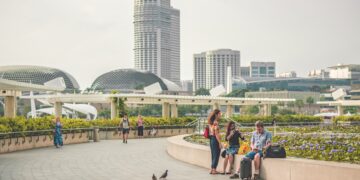Singapore is exploring the possibility of extending anti-money laundering (AML) controls to encompass luxury assets such as cars, watches, and handbags, alongside increased scrutiny of single family offices. This initiative comes in response to a significant money-laundering scandal amounting to S$2.8 billion (US$2 billion) that has shaken the Asian financial hub.
Potential Expansion of AML Requirements
The government of Singapore is considering an extension of AML regulations to cover high-value luxury assets, including vehicles, handbags, and alcohol. These items are currently not subject to AML controls, unlike precious stones or metals. In addition, family offices serving single families, which have been exempt from certain licensing requirements, may face stricter rules. The number of such offices registered in Singapore has surged, reaching over 1,000 from 2020 to 2022.
Caution Amidst Ongoing Investigation
While addressing the money laundering investigation, the Singaporean government has emphasized the need to avoid hasty and reactive measures that could negatively impact the city-state’s business environment. They are mindful of striking a balance between enhancing AML measures and maintaining a conducive business environment.
Widening Investigation and Implications
The total value of assets seized or frozen as part of the ongoing investigation has nearly tripled since the scandal came to light in August. The case has involved the arrest of ten individuals and the confiscation of luxury cars, designer watches, handbags, expensive wine, cash, and gold bars. Various entities, including foreign and local banks, property agents, precious metals dealers, and elite golf clubs, have been implicated.
Public Pressure for Stricter Regulations
The Singaporean government has faced public pressure to combat illicit activities and address concerns about how the money laundering syndicate, believed to have laundered proceeds from overseas criminal activities and forgery, could operate for an extended period despite the city-state’s stringent financial regulations.
Formation of Interministerial Committee and Potential Measures
In response to these challenges, an interministerial committee, led by the second minister for finance, Indranee Rajah, will be established to explore additional measures aimed at strengthening Singapore’s AML framework. In addition to considering extending due diligence controls to luxury asset purchases, the government will examine tightening immigration verification processes. Singapore has experienced an influx of wealth and individuals, particularly from China, since the onset of the COVID-19 pandemic.
Balancing Act
Josephine Teo, the second minister for home affairs, stressed the importance of introducing new AML measures cautiously and with careful moderation. Singapore is committed to maintaining a business-friendly environment while addressing AML challenges and ensuring that its antitrust and money-laundering regulations comply with international standards.
Impact on Financial Community
The money laundering case has already had repercussions within Singapore’s financial community. Wealth managers and other advisers have reported extended waiting periods to open private banking accounts for clients with foreign passports, particularly from China. Some existing accounts have been closed as authorities have tightened due diligence.
Enhancing Scrutiny of Single Family Offices
The government is also considering strengthening oversight of single family offices, many of which were established by affluent mainland Chinese individuals and currently receive exemptions from licensing requirements. Some of the accused individuals in the money laundering case may have benefited from incentives provided by Singapore’s family office scheme.
Review of Incentive Administration
The Monetary Authority of Singapore is conducting a review of its internal incentive administration processes to ensure compliance with regulations.
Overall, Singapore is actively addressing the money laundering issue and striving to enhance its AML framework to uphold its reputation as a global financial hub.
Stay informed on supply chain news at The Supply Chain Report. Free international trade tools are at ADAMftd.com.
#SingaporeAML #LuxuryAssets #MoneyLaundering #AMLRegulations #FamilyOffices #WealthManagement #SingaporeFinance #MoneyLaunderingScandal #FinancialRegulations #AMLExpansion #BusinessEnvironment #FinancialCrime #LuxuryAssetControls #SingaporeBusiness #AMLFramework #FinancialHub #MonetaryAuthorityofSingapore #PrivateBanking #FinancialScrutiny #AssetSeizure #WealthInflux #AMLCompliance
















